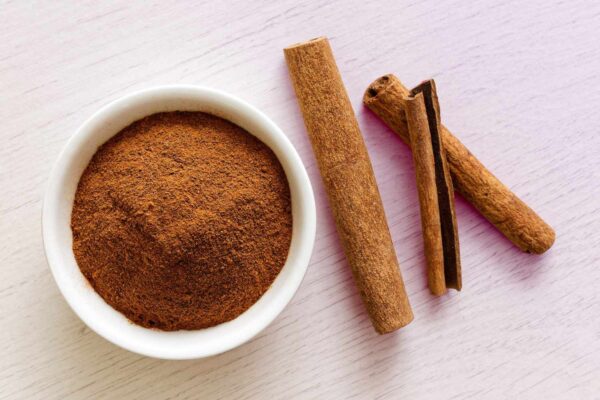Introduction:Cinnamon
Cinnamon, a spice celebrated for its aroma and flavor, has garnered attention for its potential health perks across centuries. Derived from the inner bark of Cinnamomum trees, it holds a special place in both culinary and medicinal realms. This article explores the manifold health advantages associated with cinnamon consumption.
Rich in Antioxidants
Cinnamon boasts a wealth of antioxidants, including polyphenols, renowned for their ability to combat oxidative stress and reduce inflammation.
Polyphenol Power
Polyphenols found in cinnamon help protect cells from damage caused by free radicals, thereby promoting overall health and well-being.
Combatting Oxidative Stress
By neutralizing free radicals, cinnamon’s antioxidants play a crucial role in reducing inflammation and preventing chronic diseases such as heart disease and cancer.
Anti-Inflammatory Properties
Cinnamon contains bioactive compounds with potent anti-inflammatory properties, making it a valuable ally in alleviating chronic inflammation and associated health conditions.
Alleviating Chronic Inflammation
The anti-inflammatory compounds present in cinnamon help suppress inflammatory responses in the body, potentially reducing the risk of conditions like arthritis and cardiovascular disease.
Bioactive Compounds in Action
Compounds such as cinnamaldehyde and cinnamic acid in cinnamon exert anti-inflammatory effects, contributing to its overall health-promoting properties.
Blood Sugar Regulation
Cinnamon has garnered attention for its ability to help regulate blood sugar levels, making it particularly beneficial for individuals with diabetes or those at risk of developing the condition.
Improving Insulin Sensitivity
Studies suggest that cinnamon may improve insulin sensitivity, facilitating the uptake of glucose by cells and leading to better blood sugar control.
3.2 Supporting Glucose Uptake
By enhancing glucose uptake, cinnamon helps stabilize blood sugar levels, reducing the risk of insulin resistance and type 2 diabetes.
Heart Health Support
Incorporating cinnamon into your diet may offer significant benefits for heart health, including lowering cholesterol levels and reducing blood pressure.
Cholesterol Management
Cinnamon consumption has been associated with a decrease in LDL (bad) cholesterol levels and an increase in HDL (good) cholesterol levels, contributing to improved lipid profiles.
Blood Pressure Reduction
Cinnamon’s anti-inflammatory and antioxidant properties help reduce inflammation in the blood vessels and improve vascular function, thereby lowering blood pressure and reducing the risk of heart disease and stroke.
Antimicrobial Effects
Cinnamon has been revered for its antimicrobial properties since ancient times, with its natural compounds exhibiting potent antibacterial, antifungal, and antiviral activities.
Ancient Remedies Validated
Studies have confirmed cinnamon’s efficacy in combating microbial infections, making it a valuable natural remedy for various infections, including respiratory and skin conditions.
Fighting Microbial Infections
Compounds such as cinnamaldehyde and eugenol in cinnamon play a key role in fighting microbial infections, supporting immune function and overall health.
Cognitive Function Enhancement
Emerging research suggests that cinnamon may have neuroprotective effects and could potentially enhance cognitive function, offering promising benefits for brain health.
Neuroprotective Potential
Cinnamon extract has been shown to protect brain cells from damage, reduce inflammation in the brain, and improve cognitive performance in animal studies.
Cognitive Performance Improvement
While further research is needed to fully understand cinnamon’s effects on cognitive function in humans, these preliminary findings hold promise for its potential role in supporting brain health and reducing the risk of age-related cognitive decline.
Digestive Health Promotion
Cinnamon has long been used in traditional medicine to aid digestion and alleviate gastrointestinal discomfort, thanks to its carminative properties and potential anti-ulcer effects.
Soothing the Digestive Tract
It helps soothe the digestive tract, reduce bloating and gas, and promote healthy digestion, making it a valuable addition to a balanced diet.
Anti-Ulcer Effects
It may possess anti-ulcer effects, protecting the stomach lining from damage and reducing the risk of gastric ulcers, further supporting digestive health and comfort.
Conclusion
It emerges not only as a culinary delight but also as a powerhouse of health benefits, offering a wide range of advantages for overall well-being. From its antioxidant and anti-inflammatory properties to its role in blood sugar regulation, heart health, and beyond, it stands as a beacon of holistic health. Embrace the goodness of cinnamon and incorporate it into your diet to promote vitality, longevity, and optimal health.
